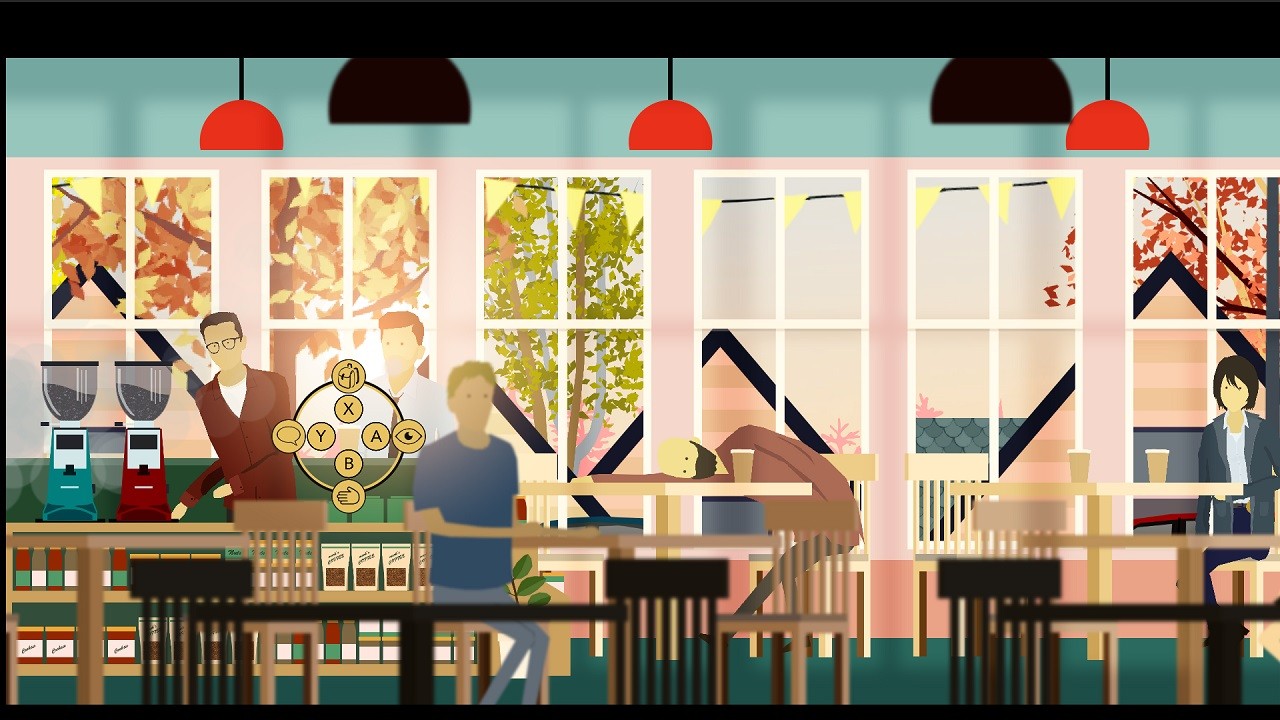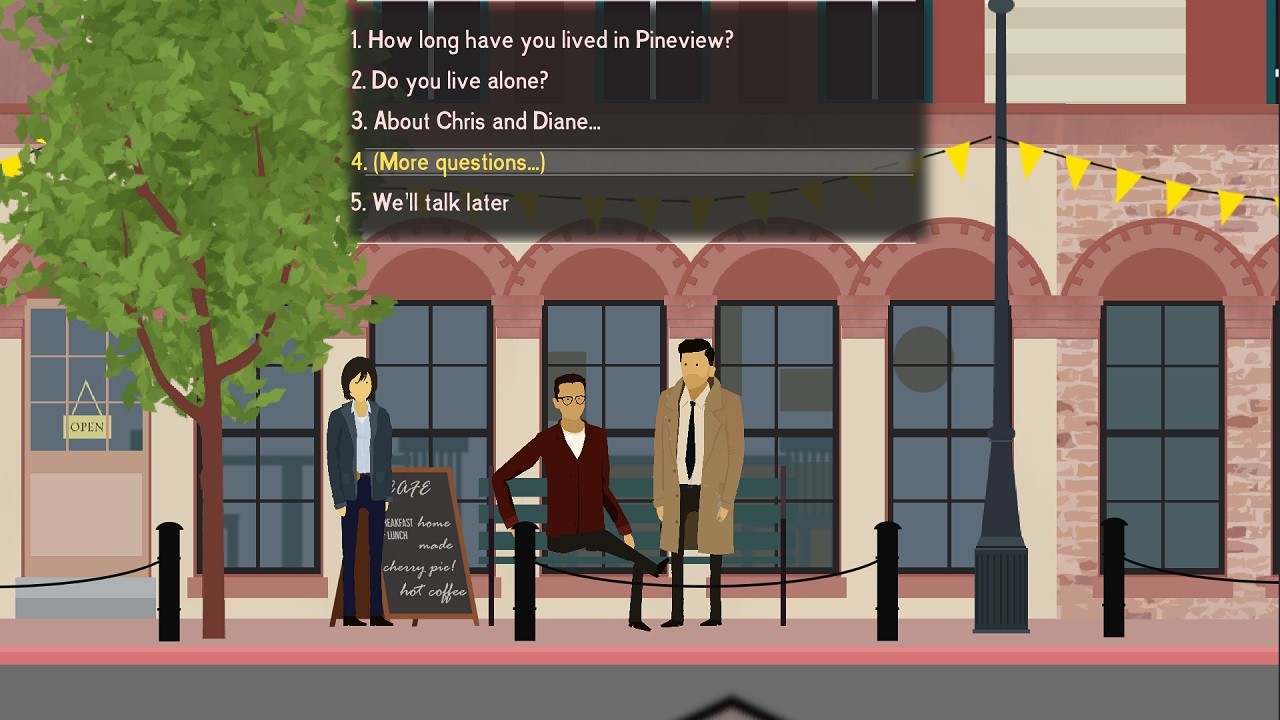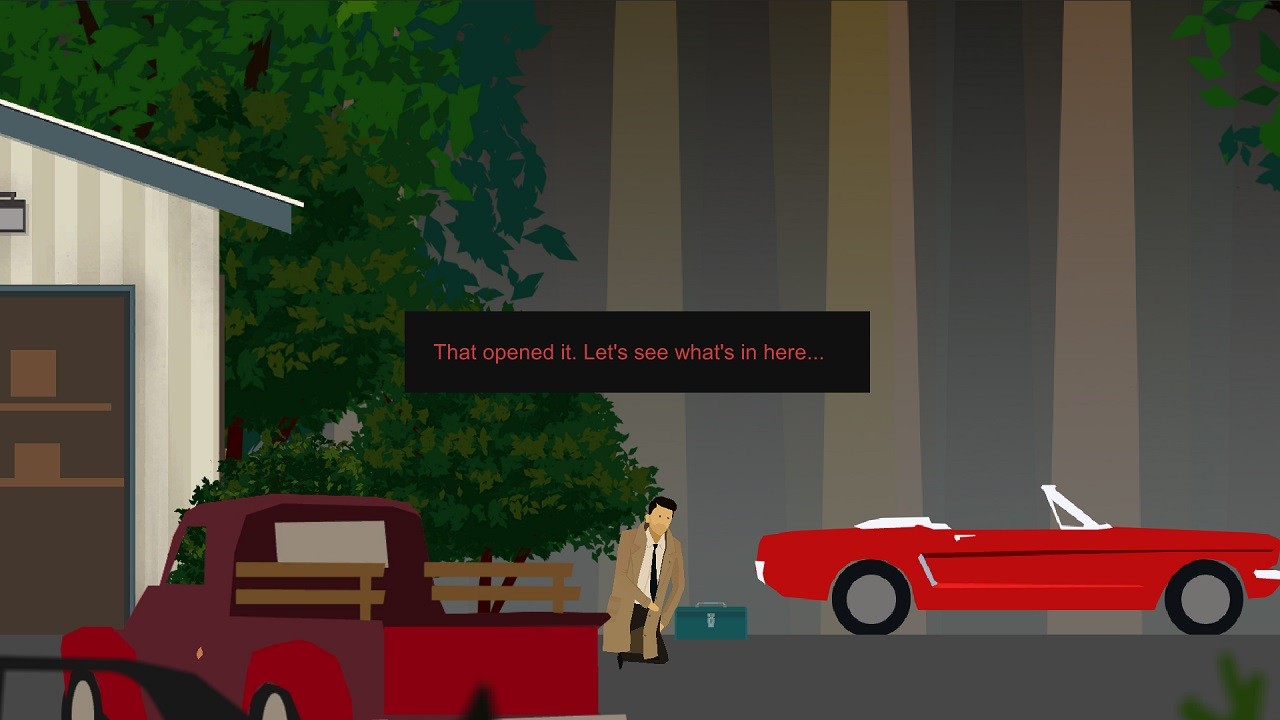
The human mind is a labyrinth of some truly awful and horrible moments, and it resides within each of us, like it or not. Sure, there is plenty we can do to keep the darkness at bay, and many of us will go our whole lives only dipping a toe into the vast ocean of terrible that could reside down there. But the demons are there, and sometimes it’s just a single moment, a single slip, that causes us to lose our grip and descend, barely thrashing, into the drowning sorrow of it all. We look for light and hope for a better tomorrow, and, with a little help, we can find it: in other people, in wonderful moments, and hopefully within ourselves. These serious and heavy thoughts and more all came together during the short, sad time that we spend within the world of Frostwood Interactive’s Rainswept.
Michael Stone is called away from his job in the big city to come and investigate a crime in the tiny town of Pineview, though the local law enforcement doesn’t think it’s necessary. As far as they can tell, this is a clear case of a murder-suicide, something that seems obvious to them thanks to the tightly knit and very judgmental community. The victims, Chris and Diane, were relatively new to the town, and hadn’t bothered to make a lot of friends, creating their roles as outsiders amongst an otherwise very pleasant area. Whispers of fights and violence have circulated around, so it seems to the townsfolk that, however gristly it might be, this ending seemed only a matter of time. But, for Detective Stone, he believes there’s more to the case, not the least of which is owing to the ghosts that haunt his own past and cloud his judgement. Paired up with the empathetic and patient Amy Blunt, Detective Stone sets out on a timed quest for the truth, learning more about himself and about Chris and Diane, all while trying to find sunlight in this endless stretch of rain.
Rainswept treads the line between adventure games and visual novel, bringing forward thoughts of past plays through games like Oxenfree, A Night in the Woods and Afterparty, though the tonality veers far away from the latter. You are in control of Detective Stone for the majority of the game as you investigate, talking to different people in town and slowly piecing things together through questions and answers, visually investigating a point when it seems fitting, though there is also minimal inventory play at work. Usually, items that you find will be used almost immediately, though there are a couple of instances where you’ll hang onto something a bit longer before fitting it in. This isn’t a Monkey Island jaunt, is what I’m saying: Stone won’t be carrying eighteen different candles at once. When the story calls for it, the player will shift perspectives into the role of Chris, the deceased and potential murderer, as you see what happened in his shared life with Diane in the time before his death. Chris’ story begins long before any of these things really happened, and it’s a sharp contrast, at times, to what Detective Stone is dealing with, though not entirely dissimilar.

As a 2D narrative game, Rainswept only has one ending that I could see, and you get from this game what you put into it. If you’re looking for adventure or action, there is absolutely zero. The most exciting moments come from moving to different parts of the town and talking to new people, and most of the rewards are when you mentally connect things and then your on screen character confirms them. As I mentioned, since this is so story driven, some players will get bored or listless at times. The pacing for Rainswept is decent, but there were several times where I felt like I was just sort of dragging along, waiting for more to happen. It is important, I realize, to see Chris and Diane’s first interactions, to understand what lead them to the brutal end, but it was a scene that felt almost inappropriately out-of-place given the pace of everything else that was happening. At least, that would have been the case, if I wasn’t pretty damn on board with the story from the get-go.
Rainswept does an amazing job of really tackling some truly difficult ideas within a game, with things like depression, mental disorders, guilt, insomnia, and the horrifying actions of obsession and demons of your past surfacing in the present. Michael is a very sad man who is trying his best to live life while also being burdened under unbelievable guilt for what happened in the past. The scene of him dealing with sleep paralysis and facing ghosts had the potential to be goofy, but it was more grim than anything else. How everyone interfaces with each other gives quirks and personalities to the town at large, and to see the way they viewed Chris and Diane through different lenses – loners, weirdos, lost souls, trapped prisoners – tells you a lot about how other people view your problems when they don’t ask. The flashbacks for Diane and Chris evoke a lot of emotion as you see them struggling with forces that often feel greater than they are, and the truth is that no one is perfect. Though nobody deserves to die, it’s hard to see any one person as a straight “victim” in this case. Even the perpetrator themselves carries scars of abuse that manifest in terrible ways at the most inopportune times. I’m trying my best not to spoil it, but unhappy people do unhappy things, intentionally or otherwise.

Yet there is hope mixed into it all. Though we cannot save the two dead lovers, we can see Michael grow and evolve, see him open up and listen to Amy to learn more about himself, and about the reality of life. The sun doesn’t always come down, though it can feel like a long time before it clears up. There are moments of wonder shot through this game, and I think the slightly blurred, almost minimalist art styling that Frostwood Interactive decided upon giving greater gravity of what we can see in the characters, in their body language and movements. Add in a hauntingly atmospheric soundtrack to keep everything melancholy and foreboding (without being scary) and you’ve got an ensnaring experience that keeps you moving forward to the very end, and, sadly, there is only one ending. We can’t reverse time, nor forgive a crime, even when it springs from a place of pain. But we can heal. And we can move on.
My only complaint, and this is such a sticking, needling point, is that the ability to toggle smoking off in Rainswept feels half hearted and insincere. This is weird, but bear with me. You have a dedicated button to make Detective Stone smoke or not smoke. When he’s smoking, he always carries a cigarette. When it’s off, the cigarette is gone, no smoke around his face, a done deal. I hate smoking straight up, and I toggled it off. However, every time there’s a pre-rendered exchange with other characters, Michael takes out his damn cigarette again. There’s even several pre-renders where we talk about Michael smoking, so what’s the freaking point??? If he’s going to smoke no matter what based on the dialogue or the storyline, just leave the cigarette in play continuously. Don’t jerk me around and make me hope I can stop smoking. It’s so petty, I know, but it irked me to no end.
Rainswept is a pretty memorable journey, and it carries a lot of weight with it: trigger warnings should be obvious, but please make sure you’re in a good place before diving into something that starts with a silhouette of David shooting himself in the head. When you’re ready, and you want this sort of story, remember the words of Brandon Lee: It can’t rain all the time.
REVIEW CODE: A complimentary Nintendo Switch code was provided to Bonus Stage for this review. Please send all review code enquiries to press@4gn.co.uk.
Subscribe to our mailing list
Get the latest game reviews, news, features, and more straight to your inbox
Thank you for subscribing to Bonus Stage.
Something went wrong.
Rainswept Review
-
Gameplay - 8/10
8/10
-
Graphics - 8/10
8/10
-
Sound - 8/10
8/10
-
Replay Value - 8/10
8/10
Overall
Summary
It was sad, but it was also beautiful, and we must love each moment to appreciate the full picture.





